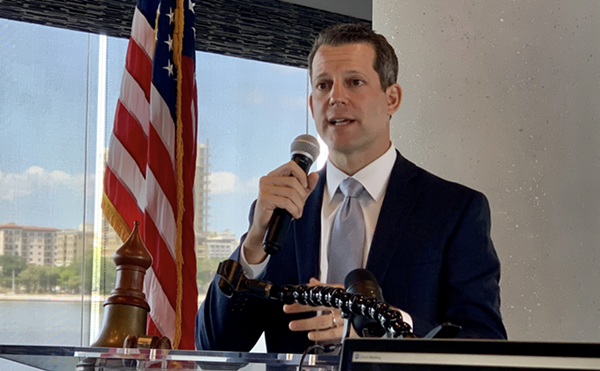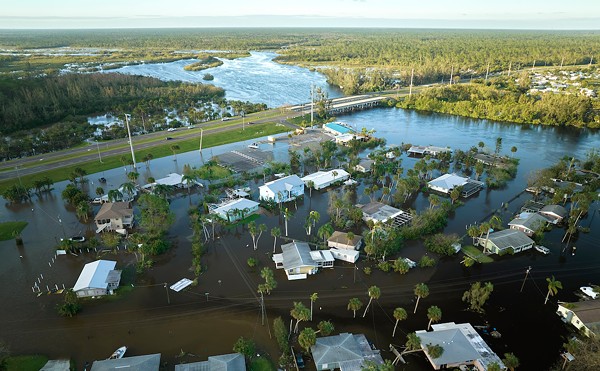On a summer day three years ago, Elijah Robinson was digging in the yard of his brand-new patio home in Columbia, S.C., when an unexpected sensation washed over him. Even though he was covered in protective clothing, including gloves and boots, the 58-year-old retired maintenance man felt as if his body had just been hurled into a fire. He raced into the one-story house through the garage door, passing his wife as he stripped off his clothes. "Darlene," he said, "I'm burning."
Robinson showered, but the feeling didn't subside. Nor did it leave the next day, or the next. He tried to hide the pain from his wife, but his appearance gave him away. His arms broke into runny sores. The side of his neck grew swollen. His face swelled up, too, to the point of appearing disfigured. Soon Darlene Robinson, a minister, was feeling burning sensations of her own. She developed blisters on her skin, which sometimes bled. Her brown skin grew darker and spotted.
That summer, the Robinsons' house, located in a Columbia neighborhood called The Summit, started smelling like geraniums. "It was so sweet, it would nauseate you," Darlene says. "It felt like the air in the house was taken from us." When they were home, both husband and wife had trouble breathing; they suffered relentless itching that scratching couldn't quell. Doctors advised them to open their windows, but that only made the symptoms worse. In the early mornings, Darlene says, "my lungs would wake me up trying to get air." The ailments afflicted others too. Some neighbors reported that their children had developed skin rashes and breathing difficulties. After the Robinsons' twin grandsons visited, the boys likewise developed symptoms of their own. Then one of them, a sickly child who had been born premature, suddenly and unexpectedly died. JaSean Robinson was 10 months old.
Richard Albright recognized the symptoms immediately. An environmental specialist with the District of Columbia Department of Health, Albright has been overseeing the cleanup of a wealthy Washington neighborhood contaminated with chemical weapons.
When Darlene Robinson accidentally called Albright's department — she was looking for the U.S. Environmental Protection Agency (EPA) — the receptionist knew exactly where to direct her call. "She was describing these symptoms, and I thought, 'This sounds like Lewisite,'" says Albright, a talkative 61-year-old with a bushy gray mustache. "It couldn't be anything else." A chemical warfare agent developed in 1918 and stockpiled during World War II, Lewisite was designed to make the skin blister and burn. It causes breathing problems and is potentially fatal. "The joke of the day," says Albright, "was that if you put three drops on the tongue of a dog, it would kill the owner."
When the Robinsons went to the University of Texas for evaluations in 2002, medical toxicologist Arch Carson agreed with Albright, concluding that the couple's symptoms were "consistent with Lewisite exposures." Even the smell matched the Robinsons' description: According to a fact sheet published by the U.S. Centers for Disease Control and Prevention, "Lewisite has an odor like geraniums."
It turns out that The Summit was the site of the Pontiac Precision Bombing Range, an 1,873-acre tract used by the military during the 1940s. At the time, the United States had fallen behind in its chemical-weapons technology, particularly its ordnance delivery systems. Fearing that Hitler could unleash nerve or blistering agents at any time, the U.S. military secretly commandeered non-chemical bombing ranges to test the newest generation of weapons containing poisons like Lewisite. "These were not listed in any of the journals or manifests," Albright says, yet they presented long-term threats. "The chemical rounds don't have to detonate. They'll eventually corrode through and contaminate the environment."
The bombing range was all but forgotten until April 2001, shortly before Elijah Robinson's garden incident. That month, a plumber laying pipe at a construction site in The Summit found eight green-striped canisters and accidentally punctured one. He developed blisters on his arms and side, along with breathing problems. Subsequent tests detected the presence of low levels of Lewisite in the soil. Still, the military remains adamant that its practice bombs at the Pontiac range contained only sand and flour. The Army Corps of Engineers, which is responsible for cleanup of former military sites, insists the initial test data was wrong and residents of The Summit are safe. "It is our contention that there is no chemical contamination at the site," says Corps spokesman Billy Birdwell. "We have no evidence of that."
Double-edged sword
In the South, the military's presence, and its ghost, are everywhere. No other region of the country is more dependent on the armed services for the vitality of its communities. More than 55 percent of all soldiers in the continental United States are stationed on Southern bases, fueling the economies of small towns and large cities from Norfolk to Key West. According to statewide surveys, the military pours $65 billion annually into the economies of Florida, Georgia and North Carolina alone. In Onslow County, N.C., for example, 87 percent of the county population is directly tied to Camp Lejeune Marine Corps Base, located in Jacksonville, and the annual impact is estimated at $2 billion. "If it wasn't for Camp Lejeune," says local activist Jerry Ensminger, "Jacksonville would be a fishing community, and an extremely small one."
















